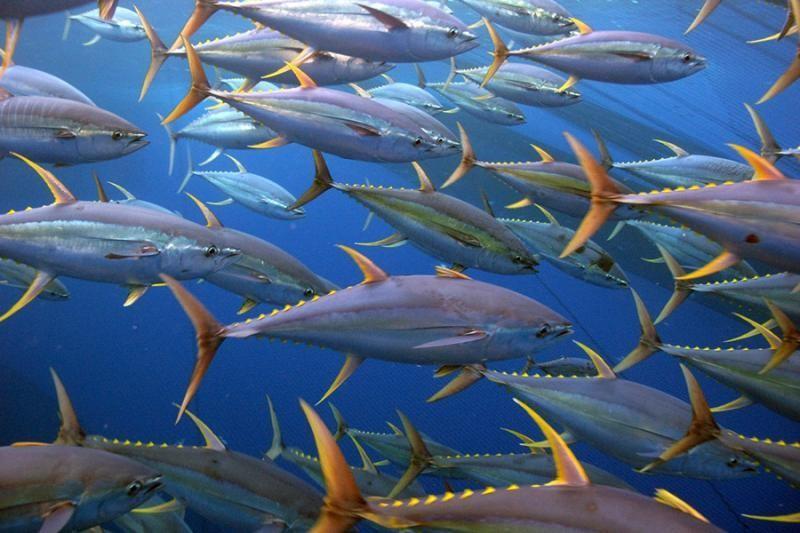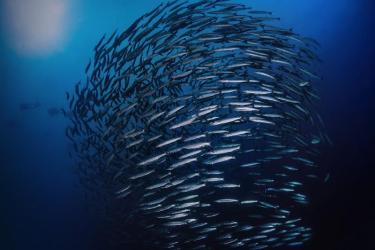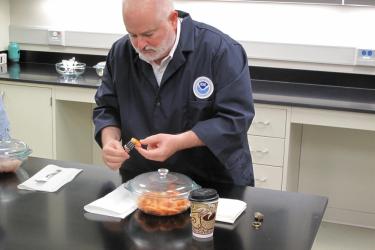The U.S. delegation to the International Commission for Conservation of Atlantic Tunas played a pivotal role in the adoption of a wide-ranging set of conservation and management measures. At the 2023 annual meeting parties from around the world came together to build consensus on high priority issues. These included new management measures for some key stocks, bycatch reduction measures for protected species, principles to address forced labor in ICCAT fisheries, and robust standards for the use of electronic monitoring.
Key Management Measures for Priority Stocks
The Commission considered a number of important conservation and management measures this year, including:
- North Atlantic swordfish
- Tropical tunas
- North Atlantic albacore
- North and South Atlantic blue shark stocks
It adopted science-based measures for all.
The measures adopted for tropical tunas and North Atlantic swordfish extended current management provisions through 2024. Both maintained the total allowable catch levels for these stocks and the United States retained its catch limits. However, these extensions fell short of the meeting’s goal to adopt more forward leaning measures for tropical tunas and for northern swordfish. For tropical tunas, ICCAT has made concerted efforts for years to agree on a revised conservation and management measure. Those efforts have not yet come to fruition. Work will continue in 2024 to build on the progress achieved so far.
With regard to North Atlantic swordfish, the Commission came very near to adopting a management procedure this year. However,due to an unexpected delay in finalizing scientific advice, the Commission had to defer a decision on the matter until 2024. Work on the North Atlantic swordfish management strategy evaluation process will continue in 2024.
The Commission adopted the results of the application of the North Atlantic albacore management procedure, first adopted in 2021, to establish a total allowable catch for the 2024–2026 period. Among other things, the revised recommendation increased the annual total allowable catch by 25 percent. This was allocated to those Parties with a catch limit, including the United States. The new U.S. catch limit is 889.4 tons. ICCAT also adopted the final piece of the bluefin tuna management procedure this year. This includes the exceptional circumstances protocol, which provides a process for determining when to deviate from applying the procedure and what pre-agreed management actions will be taken in such cases. For North and South Atlantic blue sharks, the Commission revised existing management measures to reduce the total allowable catch to be more in line with scientific advice. The Commission also requested that the Standing Committee on Research and Statistics begin assessing the feasibility of developing management strategy evaluations for both blue shark stocks.
These evaluations are a critically important tool for modern fisheries management, including in regional fisheries management organizations such as ICCAT. A management procedure is an approach to fisheries management decision-making that applies a pre-agreed framework for actions, such as catch limits, designed to achieve specific management objectives related to conservation, such as stock status and fishery needs. There was a delay in the adoption of a management procedure for North Atlantic swordfish. ICCAT continues to move ahead on developing a management strategy evaluation process for high-priority stocks under its management, including tropical tunas.
New Measures Address Bycatch of Protected Species
The U.S. delegation worked closely with partners to enhance measures for protected marine species. In particular, ICCAT adopted a non-binding resolution that encourages Parties to prohibit the intentional encirclement of cetaceans in purse seine gear. ICCAT adopted two new management measures that, pending further scientific advice in 2024, will prohibit retention of whale sharks and mobulid rays, such as the Giant Manta. These key conservation measures provide important protections for these vulnerable species and represent significant progress towards addressing bycatch in ICCAT fisheries. They also bring ICCAT more in line with action already taken by other regional fisheries management organizations.
Robust Standards for Electronic Monitoring
ICCAT adopted a set of minimum programmatic and technical standards for the use of electronic monitoring systems in ICCAT fisheries. These standards came after several years of development, including extensive technical input and guidance from NOAA Fisheries. The binding measure does not require that ICCAT Parties install and use electronic monitoring on their vessels. However, those that choose to use this modernized technology to meet increased observer coverage requirements or other ICCAT scientific or compliance rules will now be held to the same set of consistent, robust standards. The adoption of these standards paves the way for increased use of this technology in ICCAT and, in particular, has the potential to significantly enhance the level of collection and reporting of key scientific data to the Commission.
Commitment to Climate-resilient Fisheries
U.S. leadership has been essential in ICCAT’s recent efforts to understand and adapt to the impacts of climate change. The Commission adopted the ICCAT Resolution on Climate Change and held its first Joint Experts’ Meeting on climate change earlier this year. The Commission deliberated on next steps to incorporate climate-related information into the ICCAT decision-making processes, from management and scientific perspectives. It will convene another joint meeting of experts in climate and fisheries science as well as fisheries management in 2024. ICCAT will advance efforts to prioritize the integration of climate science in its work and seek adoption of a formal ICCAT Plan of Action on Climate Change.
Key Labor Standards for Crew
There have been alarming reports about alleged labor abuses occurring in some fisheries around the world. Several regional fisheries management organizations have started to examine this critical issue. ICCAT discussed and adopted a non-binding resolution laying out core principles on labor standards related to the treatment of crew. The resolution takes inspiration from existing international instruments that set labor standards for work in the fishing industry. It also provides a mechanism for ICCAT parties to continue sharing information and resources about how to combat labor abuses in its fisheries, and report on recent domestic actions to advance the goals of the resolution.



